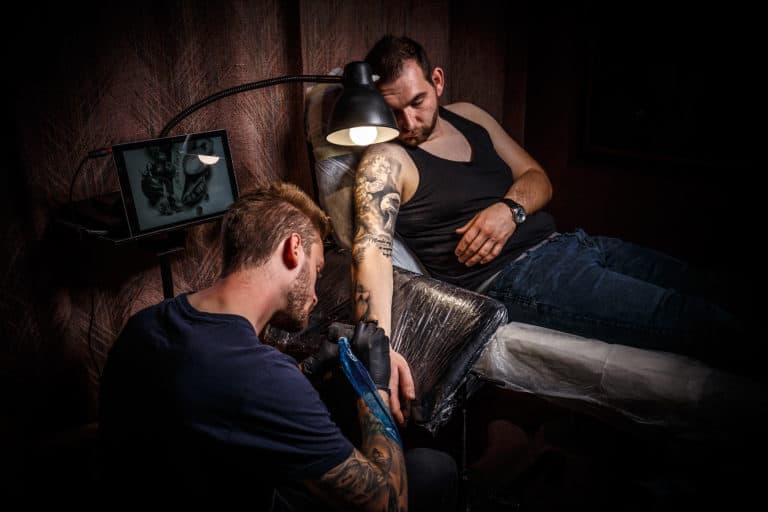Unfortunately at some point, all of us tattooed folk have had a tattoo become blurry or faded. There are many reasons that tattoos fade. Some of them you can control and others you can’t. Fortunately, there are some preventive measures you can take to reduce the possibility of fading.
In short, the reason is because of aging and the sun. Tattoo fading is inevitable, but fixable.
Some things to note:
- All tattoos will change and fade over time, especially if you get these tattoos at a young age and have them for a large portion of your life.
- Preventative measures can be taken before and after you get your tattoo. They can even be taken years after. It’s never too late to care for your skin.
- The two main reasons tattoos fade is due to the sun and your body aging over time.
Sun Damage and Stretching of the Skin:
Think about this: your skin is your protective layer from the outside world. Our skin is constantly trying to heal itself from the sun, microabrasions, cuts, burns, etc. Our skin is regenerative and you actually have “new” skin every seven years. One of the main reasons our tattoos will fade or blur over time is because of skin regeneration. As our skin changes, our skin stretches which is what 
When you are getting tattooed, the needle actually penetrates the dermis, which is the layer underneath the visible skin. This is why tattoos stay on your skin forever, because the ink is actually underneath the first layer skin.
Growing can also change the tattoos appearance over time. This is why many artists do not want to tattoo on people younger than 18, because adolescents still have a lot of growing to do versus someone who has reached maturity.
Anything that causes your skin to stretch increases the likelihood of tattoo fading. The two most common reasons for skin stretching are weight gain and pregnancy. Women who are interested in getting their stomach areas tattooed before having children should really consider the impact a pregnancy could have on the tattoo they are considering.
Preventing Sun Damage:
The sun is one of the main reasons tattoos fade over time. When you first get a tattoo, you should avoid being in the sun until it fully heals. Applying sunscreen will greatly decrease your chances of ink fading. Use a high SPF or a tattoo-specific sunscreen to protect your skin.
UV rays from tanning beds are also harmful to tattoos and can cause damage to the skin. Tanning beds are actually more harmful than the sun because the UV is more intense and closer to your skin, causing more damage quickly.
You can pick up sunscreen that are focused on protecting tattoos in most department stores. My go to sunscreen is made by CannaSmack. You can pick up a bottle for under $10 here on Amazon.
Aging and Its Effects on Skin:
The skin constantly changes due to all kinds of factors. One of the main reasons tattoos fade is due to the changing of the skin. Your skin grows and changes to accommodate your body throughout life. If your body grows, due to gaining weight of some sort, your skin will change to accommodate that. If you have a tattoo on this area that changed, the tattoo will stretch with the skin. Weight gain due to unhealthy eating isn’t the only way a tattoo can be damaged by skin stretching.
The stretching of skin can also occur if you have a significant increase in muscle mass in a particular area. For example, if you have a tattoo on your thigh and you start doing squats to grow your quads, the tattoo will stretch with the skin as your muscle grows.
Another effect aging has is the loss of elasticity in your skin. As you get older, your skin becomes less elastic and begins to sag or wrinkle. This will also cause your tattoo to become stretched or warped in some way, and this often results in the tattoo looking faded or aged.
Can Ink Quality Impact Fading?
Believe it or not, the metal and ink quality your artist uses has a lot to do with the healing process. For one, you should know how tattooing works. It sounds easier said than done, but to 
When you are getting tattooed, the needle penetrates your second layer of skin called the dermis, aforementioned. The ink is deposited into the skin and then the bloodstream. Since your body wants to protect you, white blood cells attack the ink as it enters the bloodstream. This is why after your tattoo heals and when it is first finished, the tattoo already has “lost” some of its ink.
The reason why higher quality ink has a higher chance of healing better is because it’s made better. Lower quality ink has more chemicals in the ink and less pigment, causing the body to be able to break it down easier. While a cheaper tattoo may sound better, it will cost you more down the road to repair.
Can Color Impact Fading?
You may be surprised to find out that, the color of ink that you use in your tattoo can impact the amount of fading that occurs. Tattoo colors that are bright and vibrant are the quickest to experience fading. Dark and deep colors are much more fade resistant, though it can still occur.
Can you fix a blurry tattoo?
Yes, you can technically fix a blurry tattoo. However, essentially what you would need to do is either cover or redo the line work with a high-quality ink. The reason is because unless you remove the tattoo completely, there’s nothing else you can do. A lot of artists will essentially re-tattoo the same design over the old one to fix up the line work and make it look new again. Depending on how badly the tattoo faded or stretched, you might need to cover the tattoo.
Are certain parts of the body more prone to fading?
Yes, there are certain parts of the body that tend to fade quicker than others. For example, I got a tattoo on the inside of my foot that has faded significantly more than the others, to the point where some of the letters have almost faded completely.
Now, this could be because of a few reasons. I got the tattoo at a shop while I was on a trip in Italy. I went to the shop because my cousin had gone to this one a few years prior on her trip, however, I think the ink used was not the highest quality. It could also be because the inside of the feet are constantly rubbing together, so during the healing process I would often accidentally hit the insides of my feet together. This caused the scabbing to be picked off easier than others, which would actually “pull” ink out of the skin.
Below is a list of areas that are more prone to fading:
- The palms of hands and feet
- Fingers/toes
- The inside of the mouth
- The shoulder blades
Areas may vary and everyone is different. Some areas of your body will heal differently than another persons.
Immediate after tattoo care:
One of the most common discrepancies I see over tattoo shops is the aftercare. I’ve heard everything from using an abundance to Vaseline and keeping it wrapped for days to leaving it completely alone.
You should treat your tattoo as if it were a cut. Truthfully, that’s what a tattoo is, a damaged part of the skin your body is trying to heal. How I have always healed my tattoos and the advice I give to everyone is as follows:
- The first day, keep the tattoo wrapped for 2-3 hours after the tattoo. Your skin will secrete enzymes and white blood cells, the wrap will help the moisture stay on the body.
- After 2-3 hours, remove your wrap and let it air dry. Try to avoid friction on the area for the first few days.
- Use a thin layer of Vaseline or Aquaphor (Amazon link) twice a day, preferably in the morning and right before bed. Be careful not to put an excess on, as too much moisture will lead to a prolonged healing process.
- As the skin begins to peel, switch to a non-scented lotion. My skin usually begins to peel about a week after I get my tattoo and takes at least 2-3 days for the scabbing time go away.
- DO NOT PICK AT YOUR TATTOO. Picking at the tattoo will actually remove ink from your body.
- Avoid swimming and excess moisture while your tattoo heals. Also avoid direct sunlight and extreme heat.
In conclusion, tattoos do fade over time but this article will help you navigate the different outcomes and will hopefully help with your tattoo.

